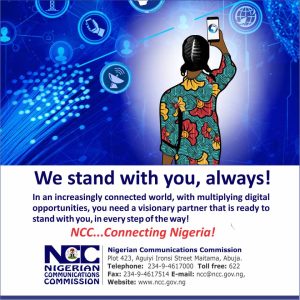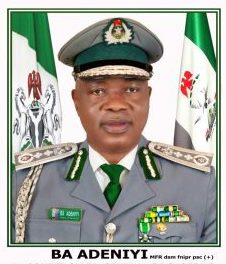

How The Comptroller-General is leveraging Public Relations to Drive The Affairs of the Customs — ACG Alajogun

Effective media management is a sine qua non for the Nigeria Customs Service to convey its policies, build trust and ensure transparency in revenue generation.
The Assistant Comptroller General (ACG) in charge of Headquarters, Barrister OA Alajogun, fsi disclosed this in a lecture entitled ‘Understanding media management by public officers’ which he delivered at the Nigeria Customs and Command and staff college, Gwagwalada, Abuja.
He stated that ‘by communicating openly, creating a positive public image, and skillfully handling difficulties, public officers can maintain their reputation as reliable public servants’
According to him, in view of the dynamic nature of communication, it is critical that the service keeps up with technical developments by making the necessary investments in knowledge and tools that will help to successfully manage the complicated media environment of its members.
Alajogun charged the workforce that each public officer is also an image maker of the organisation where he serves.
‘Today’s lecture is a clarion call for me and for you, that you are not just out there to collect revenue, you are also out there to bring to the full understanding of the public, the intricacies, the processes and procedures of what you do to the best of your ability
As you do this, you are helping the CGC to achieve his policy thrusts of collaboration, consolidation of previous gains and innovation’ he deposed.

Below is the full lecture with title: UNDERSTANDING MEDIA MANAGEMENT BY PUBLIC OFFICERS
INTRODUCTION
Today’s lecture, entitled “Media Management by Publie Officers”, was inspired by the knowledge that media management faces numerous challenges, such as the proliferation of misinformation and disinformation.
Going into this lecture, I will be giving a quick background intormation. The
historical evolution of media management progressed from limited public involvement in the Print Era, Broadcast Era, and through the rise of Radio, Television and the Internet (ICT) as we have today. Organizations worldwide, including public sector entities like the Nigeria Customs Service (NCS), began leveraging Information and Communication
Technology (1CT) to participate in domestic and international trade. This adoption of ICT played a pivotal role in enhancing efliciency and productivity across various sectors.
This transformative era democratized media management and fostered public participation through the widespread use of blogs and social media platforms such Facebook, Twitter, Instagram, WhatsApp and host of them. In the course of this lecture, we will be looking at the definition, purpose, concept of media management in the context of Nigeria Customs Service as well as the importance, challenges and way forward for both the NCS and it
officers for effective governance and communication.
BACKGROUND
The multidisciplinary field of study called ‘media management’ looks at how media
companies make the most use of limited resources in order to satisfy the demands of a particular society.
The media are those informational outlets, such as newspapers, magazines, radio, TV, and journals that may reach a wide audience with the same message
regardless of how far away the source of the information is.
People in the communication industry are now speaking about a global neighborhood family due to the influence of these
technologies becoming so widespread. Thus, radio and television, in their very form (broadcast simultaneity in reaching a heterogeneous audience) enhance interaction in the world to an unbearable degree, regardless of what they say.
Accordingly, it entails a system made up ofnations in the diaspora where people, regardless of their religious beliefs, ethnic nationalities, languages, racial backgrounds, or geographic location, live and work together to achieve specific social, economic, and political goals
and where communication is used to express these interactions.
Presently, half the world (not just Africa) is focused on one topic – the just concluded Africa Cup of Nations (AFCON) -a sports encounter between nations. The mnedia thus set agenda, interests and pursuits.
Anumber of elements have been identified as media obstacles; nonetheless, it is regrettable that the management may take the core part of media problems and prospects.
DEFINTTION: Before defining Media Management, there is need to juxtapose the two keywords
Media’ and ‘Management’: Media can be defined as the communication channels or tools used to convey information, news, entertainment, and other content to a large audience. In other words, it is the main
means of mass communication (broadcasting, publishing, and the internet) regarded collectively. Management on the other hand involves oversecing the planning. production, and distribution of various forms of media content, ranging from print and broadcast to digital platforms.
We can now define Media management as the strategic planning, organization and
control of media resources and content within a media organization. Media management ensures effective communication, audience engagement, and overall success by making informed decisions on content, resources, and distribution strategies.This secures the organization’s impact and sustainability.
The goal of media management is to produce tomorrow’s creative, media-savvy,
technologically literate strategic thinkers. The subject of business administration known as media management” focuses on recognizing and characterizing operational and strategic issues and phenomena in the management of media companies. It includes marketing, organizational management, production management, procurement management, and
strategic managemnent for media companies.
PURPOSE OF MEDIA MANAGEMENT
There are several reasons why public organisations like NCS and other government agencies pay attention to media management, some of them include:
a. Making it possible for individuals to read (and hear) not only the word but also the world in which they live in this era of globalisation.
b To study, predict and forecast changes in the organisations macro-environment and to adapt to such changes.
c. To set out the main objectives of the organisation and provide resources necessary for their accomplishment.
d. To plan, lead and direct the efforts of others towards the accomplishment of
the organizational goal.
e. To facilitate the realization of the organization’s objectives with the least
amount of input e.g. man, money, time, materials, efforts, etc.
To assist the organization in achieving growth and reputation as information
provider.
CONCEPT OF MEDIA MANAGEMENT IN THE NIGERIA CUSTOMS SERVICE
The NCS, as a vital component of the country’s revenue generation and border
control, stands at the intersection of various interests and responsibilities. The NCS operates in a dynamic and complex environment, dealing with issues ranging from trade facilitation to border security. In this complex landscape, media management becomes a strategic imperative for several reasons.
The concept of media management within the context of the NCS, emphasizes its importance in enhancing Transparency, Public Relations, Crisis Communication, Internal Communication, Policy Advocacy, Data Transparency.
Transparent communication allows the Service to address misconceptions, dispel rumors, and provide accurate information about its operations. It is there fore essential for the NCS to recognize the pivotal role of media management in its
comprehensive and all-embracing strategy.
Public Relations.
Media management enables the Service to engage with the public through various channels, disseminating information about its initiatives, achievements, and contributions. The Comptroller-General of Customs, BA Adeniyi, MER dsm fnipr fniia
fmia pse (+) whose policy thrusts anchors on Collaboration, Consolidation of Previous
Gains and Innovation is presently leveraging public relations drive the affairs of the NCS.
This proactive engagement is instrumental in constructing a favorable public perception and garnering support for the NCS’s ongoing endeavors.
Protection and overall organizational efficiency. Crisis Communication. Leveraging various media channels enables the Service to promptly address issues, provide clarifications and present its perspective, facilitating damage control and the maintenance of public trust.
Proactive communication in times of crisis is instrumental in reducing adverse efects and curbing the dissemination of misinformation.
Internal Communication. Media management is not only about external
communication but also about fostering effective internal communication within the NCS.
Clear and consistent messaging ensures that all staff members are well-informed about organizational goals, policies, and developments. This, in turn, contributes to a more cohesive and efficient working environment. An example of internal communication can be likened to the lecture you are receiving now. This has also been demonstrated internally
by the recent signing of the NCS Social Media Guidelines by the CGC.
Policy Advocacy. Media management provides a platform for the Nigeria Customs Service to advocate for policies that support its mission. By engaging with the media, the service can communicate the importance of certain regulations, seck public understanding, and garner support for initiatives aimed at enhancing trade facilitation and border security.
The Service is currently driving this through one of the CGC’s policy thrusts “Collaboration'” Data Protection.
The NCS’s business operations increasingly depend on data, and even a short period of downtime or a small amount of data loss or compromise can have major consequences on the Service. By ensuring a proactive data protection strategy, the NCS can save itself from financial losses, loss of reputation and public trust, and legal liability. This has also been demonstrated internally by the recent signing of the NCS Social.
IMPORTANCE OF MEDIA MANAGEMENT TO NIGERIA CUSTOMS SERVICE
Media management is of utmost importance for the NCS as it plays a crucial role enhancing revenue, building public perception and trust, ensuring accountability, promoting revenue-generating initiatives, and adapting to dynamic communication landscapes. The effectiveness of media management in these arcas is integral to the NCS’s
success and its ability to navigate the complex challenges associated with revenue collection. I will now proceed to the importance of media management to NCS.
Media Guidelines by the CGC.
Public Perception and Trust.
Through strategic communication, the NCS can build trust, dispel misconceptions, and create a favorable environment for revenue-generating initiatives. Therefore, it is important for the NCS to recognize the pivotal role of media management in shaping public perception, as it significantly impacts the level of trust citizens place in the Service.
Media management facilitates transparent communication of customs policies, procedures, and revenue collection processes. By proactively sharing
information about tarifl structures, trade regulations, and revenue collection mechanisms, the NCS can demonstrate accountability and foster trust among stakeholders.
Promotion of Revenue-Generating Initiatives. Well-crafted media campaigns
can highlight the benefits of compliance and cooperation, ultimately boosting revenue collection. Therefore, it is essential for the NCS to harness media management as a potent tool for promoting its revenue-generating initiatives. The service actively encourages
businesses to participate and contribute to revenue generation. It achieves this by sharing information on trade facilitation measures, incentives, and compliance requirements through diverse media channels. Accountability.
Adaptation to Changing Dynamics. The media landscape is constantly evolving,
and effective media management allows the NCS to adapt to these changes.
Utilizing digital platforms, social media (Facebook, Twitter Instagram, WhatsApp), and other modern communication channels enables the service to reach a wider audience and engage with stakeholders in real timne.
This adaptability is crucial for staying relevant, enhancing visibility, and ensuring that revenue-related messages resonate with the diverse demographics of the public.
CHALLENGES FACED BY NIGERIA CUSTOMS SERVICE IN MEDIA
MANAGEMENT
The service encounters numerous challenges in managing media effectively for its core mandates. These challenges include the following:
Information Overload and Misinformation. Disseminating accurate and pertinent information becomnes challenging amid the vast sea of data, and misinformation
poses a constant threat to the Service’s credibility.
Addressing this challenge requires the development of robust fact checking mechanisms and proactive communication strategies to ensure accurate information reaches the public.
Keeping pace with the rapidly evolving
technological landscape is a formidable challenge the NCS. Limited resources and
technological constraints may hinder the effective use of digital platforms and moden communication tools.
To address this, the Service needs to invest in technological infrastructure, digital literacy training, and partnerships with tech savvy organizations to enhance its media management capabilities and data protection.
Technological Constraints. Crisis Communication, Challenges arise during unforeseen events, demanding rapid and coherent responses. Developing a comprehensive crisis communication plan,
regular training for communication personnel, and establishing clear communication protocols can enhance the NCS’s ability to navigate crises and mitigate negative impacts on revenue generation.
Nigeria’s linguistic diversity poses a
challenge in communicating effectively with all citizens. Overcoming language barriers requires the NCS to adopt a multilingual approach, providing information in variousblanguages.
Additionally, initiatives should be taken to improve accessibility, especially in
remote or marginalized commnunities, through community outreach programs and tailored communication strategies.
Language and Accessibility Barriers.
WAY FORWARD
The NCS serves as a linchpin for revenue generation, playing a vital role in
overseeing trade regulations and collecting duties and tariffs. In the realm of contemporary communication, effective media management is paramount for the Service to convey policies, build trust, and ensure transparency in revenue collection.
The strategic way forward to overcome these obstacles include: Prioritizing investments in technology is imperative for the NCS to bolster its media management capabilities. Upgrading digital infrastructure will ensure a more seamless and efficient communication process. Adopting user-friendly
communication platforms is essential for engaging a diverse audience and facilitating bctter information dissemination. Leveraging data analytics for targeted messaging adds a laver
of precision, allowing the NCS to tailor its communication strategies based on audience preferences and needs.
Investment in Technology.
Continuous training and capacity-building programs like the one you are receiving now are crucial components in ensuring the NCS’s media
Capacity Building.
management team remains adept in handling evolving challenges. By offering regular training sessions, the team can stay abreast of the latest communication trends and tools.
This is particularly essential for navigating crisis communication effectively, where quick and informed responses are imperative. Embracing emerging technologies becomes seamless when communication personnel are well-equipped, enabling the Service to stay
at the forefront of efficient media management. It is therefore important for the NCS to prioritize ongoing training initiatives for its communication team.
Strategic Partnerships. Collaborating with media outlets, technology companies,
and communication experts can offer the NCS valuable insights and access to additional resources. By forming strategic partnerships, the Service can strengthen its ability to disseminate information effectively and navigate the intricacies of the constantly evolving media landscape.
Media outlets can provide broader platforms for communication, technology companies can offer innovative solutions, and communication experts can
contribute specialized knowledge. It is therefore imperative for the NCS to actively seek and foster such collaborations to optimize its media management strategies.
Proactive Communication. Adopting a proactive communication strategy is
crucial for the NCS to effectively anticipate potential issues and address public concerns preemptively.
Regular updates, clarifications, and active engagement with the public through various channels contribute significantly to the establishment of trust and credibility.
By being proactive in communication, the Service can stay ahead of challenges,
ensuring that the public remains well-infomed and confident in the service’s operations. It is, therefore, necessary for the NCS to prioritize and implement a proactive communication approach to maintain transparency and build a positive public image.
Cultural Sensitivity and Inclusivity. Recognizing the rich cultural diversity of
Nigeria, it is imperative for the NCS to adopt a culturally sensitive and inclusive approach to its media management. This approach involves tailoring messages to different cultural contexts, considering the unique nuances and preferences of diverse communities.
By ensuring that information is accessible and resonates with various cultural segments of the population, the Service can bridge communication gaps and foster a sense of inclusivity.
It is, therefore, crucial for the NCS to embrace this cultural sensitivity in its media management practices for effective communication and engagement with the diverse populace.
CONCLUSION
The NCS’s all-encompassing strategy places a strong emphasis on the idea that
media management is the key to increasing public trust and efficieney.
By communicating openly, creating a positive public image, and skillfully handling di fficulties; public officers
can maintain their reputation as reliable public servants. Considering the dynamic nature of communication, it is eritical that the Service keeps up with technical developments by making the necessary investments in knowledge and tools that will help to successfully manage the complicated media environment of its staff members. Through strategic media
management practices for officers, the NCS can cultivate a more informed, supportive, and engaged public, ultimately contributing to its success in fulfilling vital roles in the nation.


